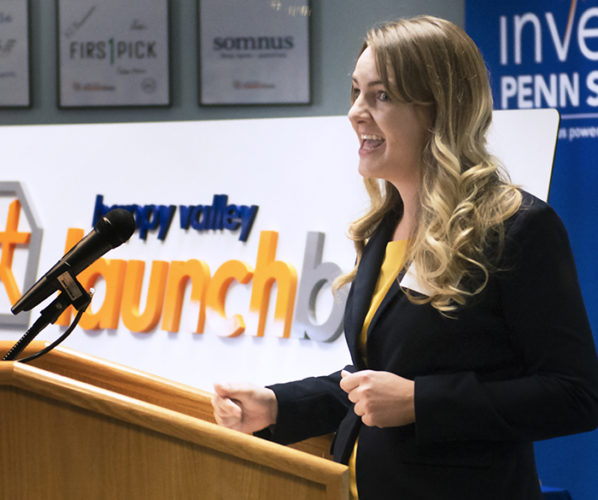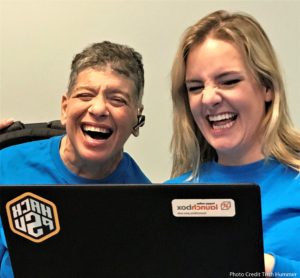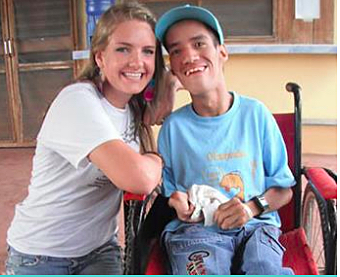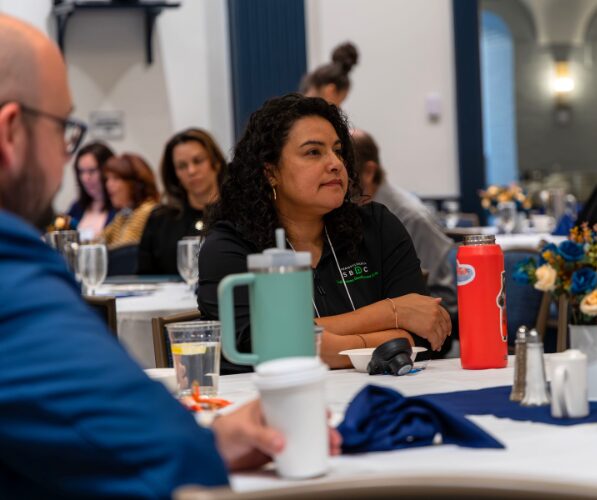Success Story
I don’t think of myself as an entrepreneur. I am just working to solve a problem I feel strongly about.
Mary Elizabeth McCullouch
Project Vive Founder
PSU Grad & Project Vive Startup Founder Shows What State College Offers Entrepreneurs
Monday, January 23, Penn State alum and Project Vive founder, Mary Elizabeth McCulloch, helped announce a $1 million grant from PNC Bank to Happy Valley LaunchBox to help local entrepreneurs and innovators in State College receive the same support McCulloch received.
“I had a dream to give a voice to the voiceless, but I lacked the money, experience and materials to pursue this dream,” said McCulloch. “The people and resources at Happy Valley LaunchBox enabled me to turn my idea into reality. I am deeply grateful to Invent Penn State for making these resources available — and to PNC for investing in the innovation hub model.”
McCulloch and her startup company, Project Vive, have seen their profile grow substantially since graduating from the Happy Valley LaunchBox FastTrack Accelerator program.
Most recently she won the $100,000 grand prize in the first annual Cisco Global Problem Solver Challenge, a pitch competition for recent college grads that rewards technology that benefits the world. Project Vive was selected from a field of more than 1,100 applications for its speech generation device, the Voz Box, which enables those with ALS and cerebral palsy to more easily communicate.
“It was just one of those moments,” McCulloch says of the Cisco competition. “It was one of those things you know will happen eventually, as you take small steps every day towards your vision. We are really excited.”
The Voz Box allows a user to speak by making small movements—a toe tap, a wrist flick or even a blink. The wearer of the device uses these small gestures to select their words from a menu of possible conversation options, which are displayed on a screen or played audibly in the ear.
While McCulloch graduated from the College of Engineering in 2016, she actually founded Project Vive as an undergraduate student at Penn State. The original idea came to her while volunteering at an orphanage in Ecuador. Several children had severe cerebral palsy, were unable to speak and relied on caregivers to ask simple “yes / no” questions. McCulloch knew there had to be a better way.
After her Engineering Design 100 professor mentioned a bioengineering competition for undergrads, McCulloch immediately began tinkering with a design. Her initial prototype didn’t win that competition, but it inspired her to keep refining the concept.
McCulloch will be the first to admit launching a hardware company is no small feat, but the growing recognition Project Vive is receiving will help as they continue to approach other large organizations for partnership and funding. The Penn State community has also been instrumental in supporting McCulloch and Project Vive.
“There is just so much support here and so many people willing to help,” said McCulloch. As an engineering undergrad, she would walk across campus to the College of Health and Human Development, and have instant access to interface with researchers in the Communication Sciences and Disorders department. “There is such a diverse set of skills and professionals; this community has so much to offer.”
In addition to assistance with her first patent application, McCulloch took advantage of Penn State’s Summer Founders program, which provides $10,000 in funding for undergraduates to pursue an entrepreneurial project. Her team also participated in—and won—the Inc. U student pitching competition, earning a $15,000 prize. In fact, she heard about the Cisco opportunity via the Penn State Small Business Development Center, whose consulting services Project Vive has also put to good use.
Nearly 4.5 million people worldwide have nonverbal diseases, and Project Vive’s technology has already shown it can have a major impact. After applying for a patent on the device, the Project Vive team continued to refine their technology with focus groups through a partnership with Dr. Andrew Geronimo at the ALS Center at Penn State Hershey. People are starting to take notice; the company was recently a finalist for the 2017 Innovation Showcase from American Society of Mechanical Engineers, and one of five finalists in the ALS Assistive Technology Challenge last year.
McCulloch is excited for the opportunities ahead. This fall, Project Vive will continue their partnership with the ALS Center at Penn State Hershey, as the two organizations were jointly accepted into an innovation program at the Penn State Clinical Translational Science Institute. That effort will allow Project Vive to gather additional input from stakeholders and patients, and further refine their customer discovery and acquisition insights. Not only that, Project Vive is coming full circle: they plan to launch a pilot study later this year in Ecuador, at the very same orphanage that inspired McCulloch at the start.
“I don’t think of myself as an entrepreneur,” says McCulloch, “I am just working to solve a problem I feel strongly about.”








